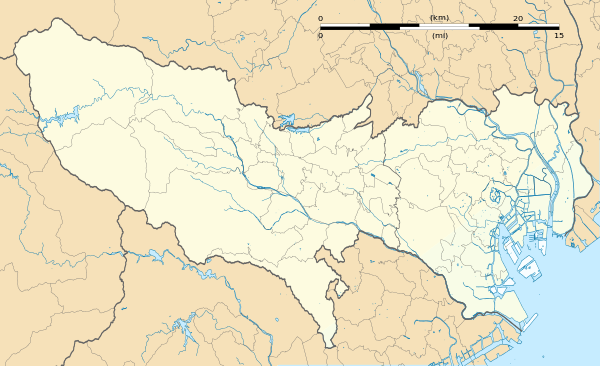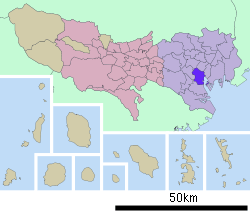Azabu High School
Azabu Junior and Senior High School (麻布中学校・高等学校, Azabu Chūgakkō Kōtōgakkō), referred to as "Azabu" by most, is a private preparatory day school in Japan. It teaches boys between seventh and twelves grades. The campus of Azabu is located in the Azabu district of Minato, Tokyo, Japan. Azabu High School technically consists of two institutions, which are Azabu Junior and Senior High Schools (麻布中学校・高等学校, Azabu Chūgakkō Kōtōgakkō), the former teaches pupils between seventh and ninth grades while the latter teaches pupils between tenth and twelves grades.
| Azabu High School | |
|---|---|
 | |
| Location | |
 Azabu High School  Azabu High School  Azabu High School | |
Moto-Azabu, Minato, Tokyo, Japan | |
| Coordinates | |
| Information | |
| Type | Private School |
| Established | 1895 |
| Founder | Soroku Ebara |
| Principal | Hideaki Taira |
| Faculty | 100 |
| Grades | 7 - 12 |
| Gender | Male |
| Enrollment | 1800 |
| Major(s) | Liberal Arts |
| Website | https://www.azabu-jh.ed.jp/about/en.html |

Azabu is perhaps most widely known as a member of "The Three Houses for Boys," along with Kaisei Academy and Musashi Junior & Senior High School. The school has been sending approximately one-third of its graduates to the University of Tokyo. Unlike other academically distinguished schools (including the other two schools that make up "The Three Houses for Boys"), the traditions at Azabu are liberal and magnanimous; there are no established school rules that students are required to adhere, and there is no "study-compelling" atmosphere.
History
Azabu was founded by Soroku Ebara, a Japanese educator in the transitional period of Japan, in 1895. He has been President of the Toyo Eiwa School since 1893. Toyo Eiwa was affiliated with the Methodist Church of Canada and due to the rise of nationalism in Japan, the school was suffering from low enrolment. Azabu was founded by Soroku who decided that the new school should not have religious affiliations.
Azabu was founded as the middle school at the Toyo Eiwa School but received its new name, Azabu Ordinary Middle School, during the first academic year. The school initially offered classes at the Toyo Eiwa Theological Seminary but it relocated to the current location in 1890 when Toyo Eiwa Theological Seminary was driven into permanent closure due to low enrollment. At the same time, the school received a new name, Azabu Middle School. After the World War II, the school was restructured to meet new regulations, and Azabu Junior and Senior High Schools were established. Although they are technically separate entities, Azabu has been managed as a single school that teaches pupils between seventh and twelves grades. During the long history of Azabu, it maintained its prestige as an academically distinguished institution. The school also remembers numerous historical events (which are not necessarily positive) including Sagami Lake Incident, and School Disputes.
Present
Azabu teaches boys between seventh and twelves grades and admits 300 students each year through a competitive admission process including written exams in Japanese, Mathematics, Science, and Social Science. These written exams are typically conducted on the first day of February annually on Azabu's campus. There are over 100 teachers and about 1,800 students in total at a given time. The school festival, which usually takes place from third to the fifth of May, is one of the largest in Japanese high schools, with over 20,000 people attending each year. The athletic meet is held in October. There are nearly 50 clubs, and the chess club, the Othello club, the go club, and the shogi club are especially well known for their achievements. The clubs (often referred to as “circles” in the school), the school festival, and the athletic meet are all planned and organized by the students' interventions from the faculty members. Azabu is also active in international exchange programs: there currently are exchange programs with Shawnigan Lake School in Canada, Winchester College in UK, and Ningbo Polytechnic in People's Republic of China.
Location/facility
The school is located in the Azabu district (the namesake of the school name) which is an area in the Minato Ward, and the nearest train station is Hiroo Station (Tokyo Metro Hibiya Line). The Azabu district is mostly a residential area, and the main gate of the school is so narrow that one may not notice that there is a large school there. This fact produced the famous phrase "Azabu’s narrow gates" implying its competitive admission policy.
The classrooms are located in the main building, which is a square-shaped, 4-story building with a courtyard. The courtyard can also be used as two tennis courts. In 1995, a building commemorating the 100th anniversary was constructed. That building houses the school's library and some club rooms. The number of books in the library is over 40,000, which is a fairly large number for a high school library.
The schoolyard has a 200-meter track (which is also a soccer field), four volleyball courts, two more tennis courts and a 25-meter pool.
References
- "Azabu's 100 Years" / 『麻布学園の100年』 Distributed by Azabu High/Junior High School
